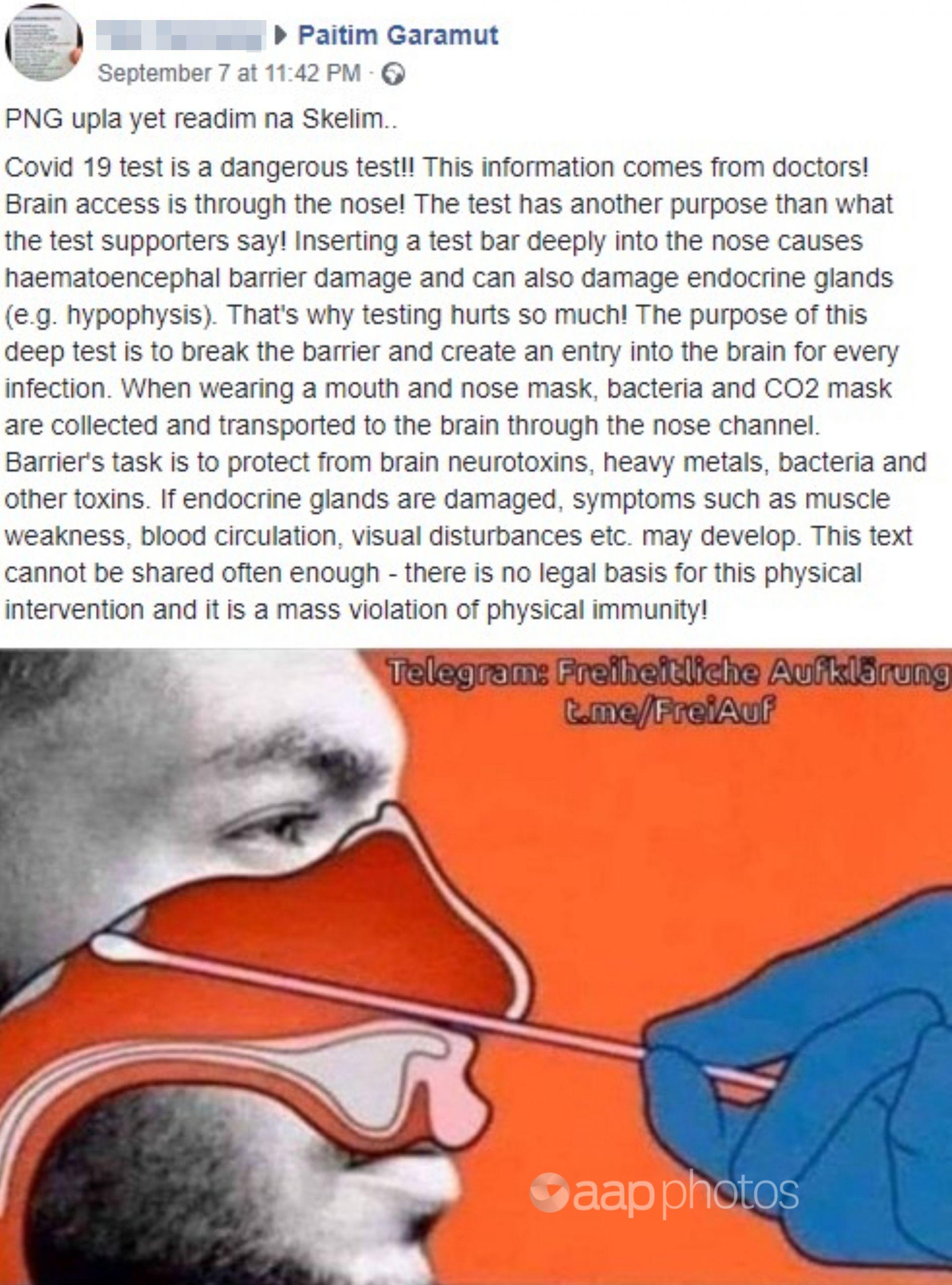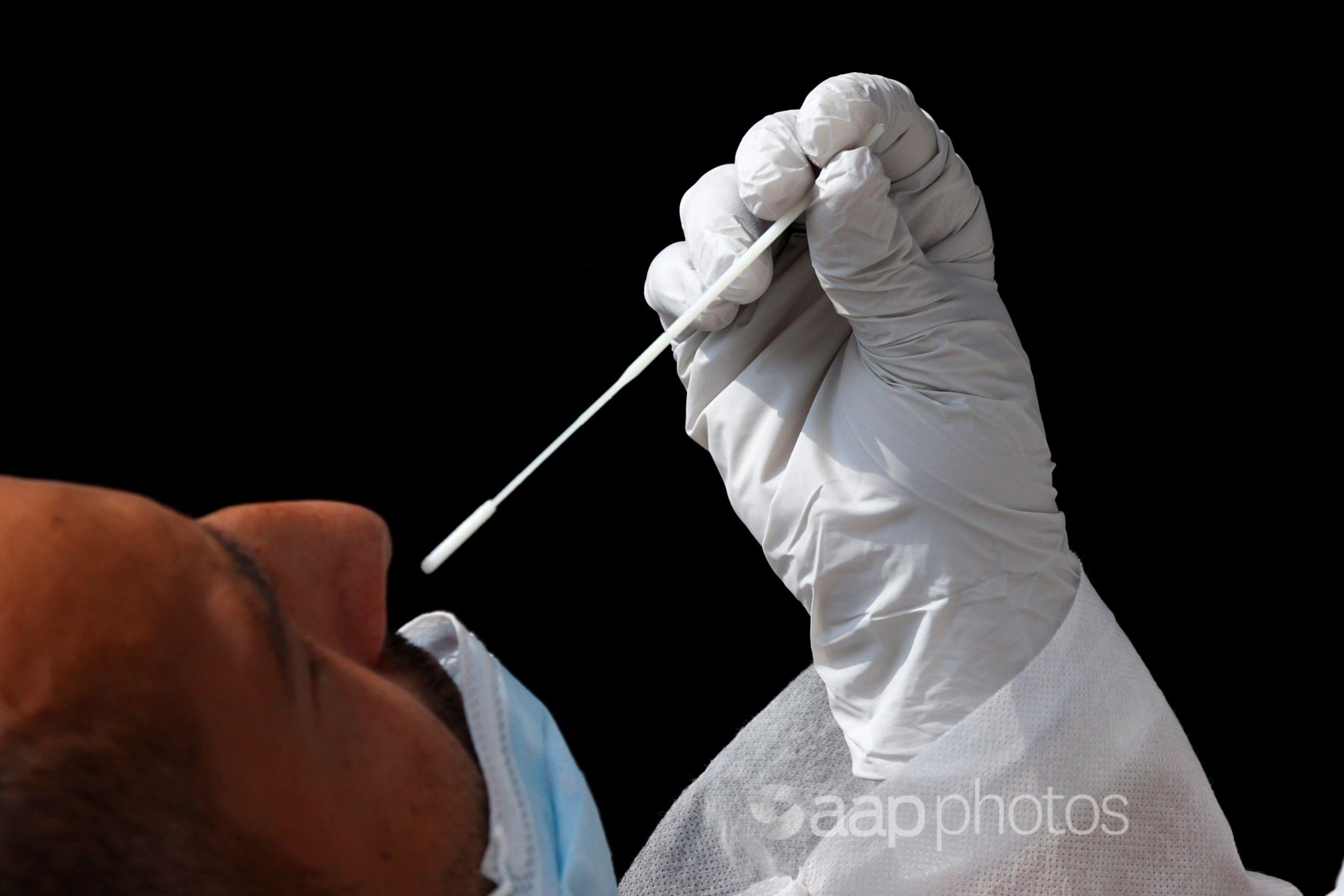The Statement
A post shared to a Papua New Guinea-based Facebook group claims the “Covid 19 test is a dangerous test,” and that the nasal swab test can enter the brain and cause lasting damage.
“Inserting a test bar deeply into the nose causes haematoencephal barrier damage and can also damage endocrine glands,” the poster claims. “The purpose of this deep test is to break the barrier and create an entry into the brain for every infection.”
The post includes several pictures of a nasal swab being inserted into the nasal canal, and claims the tests are “a mass violation of physical immunity!”
This post has been shared more than 100 times and has attracted more than 30 comments.

The Analysis
Viral Facebook posts are claiming COVID-19 nasal swabs can lead to brain infections, but doctors say a properly performed test will result in no harm to the brain.
The brain is shielded from injury by our skulls, but is also surrounded by protective fluid and membranes, and a defensive network called the haematoencephal or blood-brain barrier.
A nasal swab cannot penetrate these barriers, experts say.
Many variations of the same claim have been shared across social media, for example here, here and here.
The US Centers for Disease Control and Prevention recommend testing for anyone who has symptoms of COVID-19.
Of the tests available, the nasal swab test is considered the most reliable for diagnosing COVID-19 cases.
It requires a health care worker to collect fluid from a swab inserted deep into the nose. The swab targets the nasopharynx, the upper part of the throat behind the nose.
The Australian guidelines for this test indicate the swab should be inserted 2 to 3 cm, or until resistance is met. The resistance occurs when the swab meets the back of the nasopharynx. Between the nasopharynx and the brain is the ethmoid bone.
Dr. Eric Levi, an ear, nose and throat specialist based in Melbourne and a member of the Australian Society of Otorlaryngology Head and Neck Surgery, told AAP FactCheck in an email that a correctly performed nasal swab cannot harm the brain.
“A properly performed nasal swab by a clinician will not cause damage to the brain,” Dr Levi told AAP FactCheck.
“The roof of the nose and the floor of the brain is well protected by bony structures. As of 16 September 2020, Australia has performed 7.12 million nasal swabs and so far there has been no documented case of brain injury.”
Dr Morgan Katz, an assistant professor of medicine at Johns Hopkins University, told the Associated Press it isn’t possible for a swab to enter the brain.
The swab “would have to go through layers of muscle and fascia, as well as the base of the skull, which is a thick bone, in order to get anywhere near the blood-brain barrier, and I would say that it is not possible,” Katz told The Associated Press.
Similar claims about the COVID-19 nasal swab test have been debunked here and here.
Dr. Jürgen Götz of The University of Queensland and Dr Alan Woodruff of the Queensland Brain Institute have written about the blood-brain barrier, and how it provides a defence against disease.
“As the name suggests, this is a barrier between the brain’s blood vessels (capillaries) and the cells and other components that make up brain tissue. Whereas the skull, meninges and cerebrospinal fluid protect against physical damage, the blood–brain barrier provides a defence against disease-causing pathogens and toxins that may be present in our blood,” Dr Gotz and Dr Woodruff said in their essay.
The image on the Facebook post includes a link to the Telegram account of Freiheitliche Aufklärung (translated as “Freedom Education”) which claims to offer “Enlightenment about the Satanic New World Order & New Age Agenda.”

A Facebook post claims COVID-19 nasal swabs can damage the brain.
The Verdict
AAP FactCheck has established claims the COVID-19 nasal swab test can harm your brain as false.
Doctors say it is not possible for the nasal swab to get near the blood-brain barrier nor damage the brain.
False – The primary claims within the post are inaccurate.
* AAP FactCheck is accredited by the Poynter Institute’s International Fact-Checking Network, which promotes best practice through a stringent and transparent Code of Principles. https://aap.com.au/
All information, text and images included on the AAP Websites is for personal use only and may not be re-written, copied, re-sold or re-distributed, framed, linked, shared onto social media or otherwise used whether for compensation of any kind or not, unless you have the prior written permission of AAP. For more information, please refer to our standard terms and conditions.

















